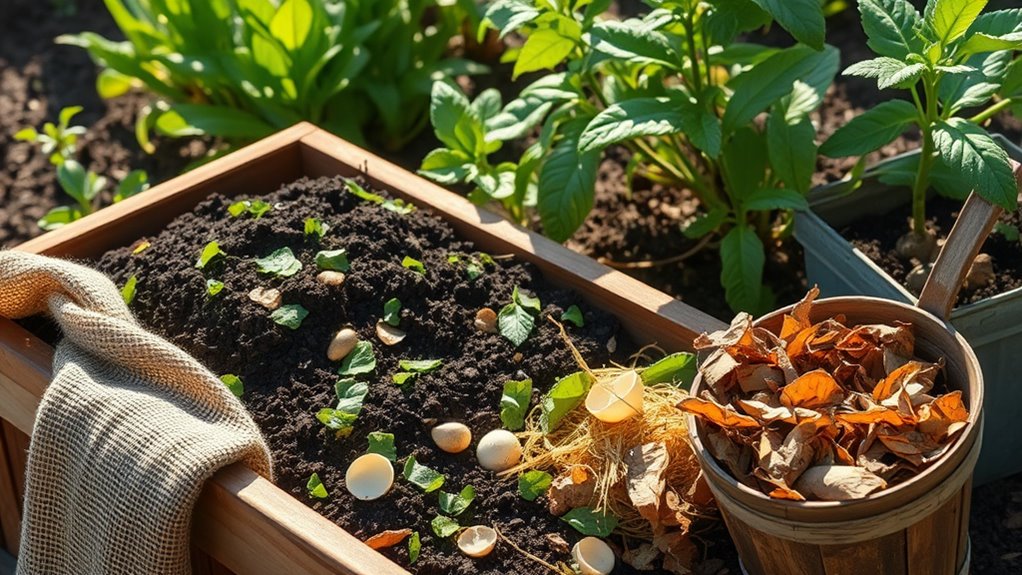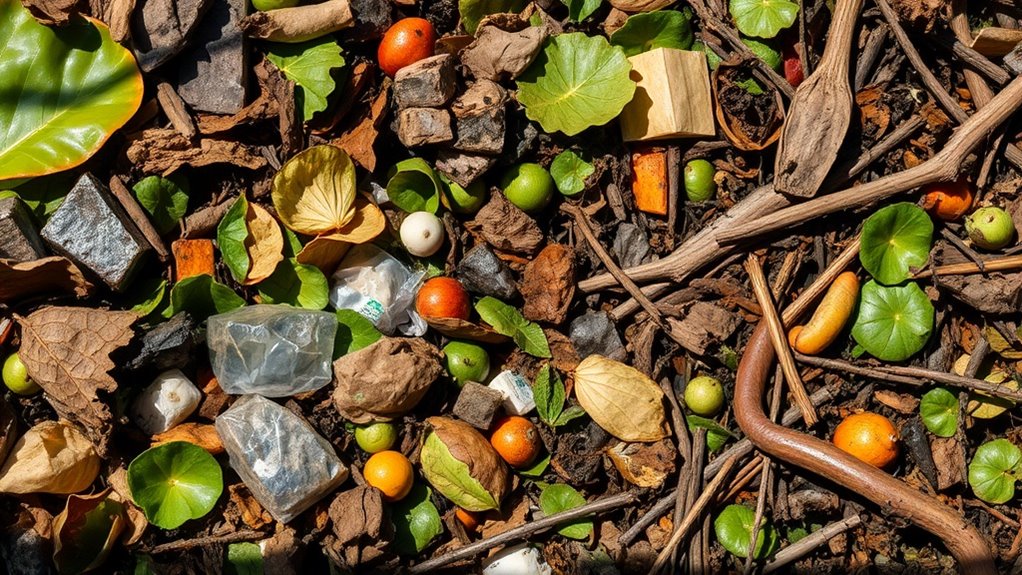Improve Soil Naturally With These Easy-to-Find Materials
It’s interesting how the simplest materials around you can significantly enhance your soil’s health. By incorporating compost, coffee grounds, and even eggshells, you can create a fertile environment for your plants. Each of these components plays a unique role in improving soil structure and nutrient availability. However, understanding the specific benefits and application methods of these materials is crucial for maximizing their effectiveness. Are you ready to uncover the potential of your garden?
Key Takeaways
-
Incorporate compost to enhance microbial activity, improve nutrient availability, and enrich soil structure for better water retention.
-
Use coffee grounds to boost soil fertility, promote microbial activity, and provide an acidic pH for acid-loving plants.
-
Add crushed eggshells to supply calcium, influence pH balance, and enhance soil structure while deterring pests.
-
Mix in leaves and grass clippings to enrich soil with carbon and nitrogen, improve water retention, and suppress weeds.
-
Apply manure to supply essential nutrients like nitrogen, phosphorus, and potassium while enhancing soil structure and microbial activity.
Compost: The Ultimate Soil Booster
How can compost transform your soil into a thriving ecosystem?
By incorporating compost, you’re providing a natural soil boost that enhances microbial activity and nutrient availability.
Research shows that compost enriches soil structure, improves water retention, and promotes root development.
The organic matter in compost fosters beneficial bacteria and fungi, essential for nutrient cycling.
Additionally, it mitigates soil compaction, facilitating aeration and drainage.
Implementing compost can significantly elevate your soil’s fertility and health, creating a robust habitat for plants and microorganisms alike.
In essence, compost acts as a catalyst for ecological balance, ensuring sustainable growth in your garden or landscape. Furthermore, using compost tea as a supplement can further amplify the benefits of compost by delivering nutrients directly to your plants’ roots.
Coffee Grounds: A Nutrient-Rich Addition
Coffee grounds serve as a nutrient-rich addition to your soil, offering a wealth of benefits for plant growth.
Rich in nitrogen, they enhance soil fertility, promoting microbial activity essential for nutrient cycling.
Their slightly acidic pH can be advantageous for acid-loving plants, improving nutrient uptake.
Additionally, coffee grounds improve soil structure, enhancing aeration and moisture retention.
When applied as a mulch, they can suppress weed growth and regulate soil temperature.
Studies show incorporating coffee grounds can lead to healthier plants and increased yields. Furthermore, they can also attract beneficial microorganisms, which further aids in soil health and plant vitality.
Eggshells: Natural Calcium for Plants
Eggshells serve as a rich source of calcium, making them an effective soil amendment for enhancing nutrient availability in your garden. By incorporating them, you can positively influence pH balance, creating a more favorable environment for plant growth. Additionally, their composting process is straightforward, allowing you to recycle kitchen waste while improving soil quality. Furthermore, crushed eggshells can also help deter pests in the garden, making them a dual-purpose addition to your soil.
Nutrient-Rich Soil Amendment
Calcium is an essential nutrient for plant growth, and utilizing eggshells as a natural soil amendment can effectively enhance soil quality.
Crushed eggshells release calcium carbonate, which gradually increases calcium levels in the soil.
This process encourages root development and nutrient uptake, improving overall plant health.
Furthermore, eggshells contribute to soil structure, enhancing aeration and drainage.
Their slow decomposition ensures a sustained nutrient supply, reducing the need for synthetic fertilizers.
By incorporating eggshells into your compost or directly into garden beds, you’re promoting a nutrient-rich environment that fosters robust plant growth and soil biodiversity.
It’s a sustainable choice for any gardener.
Ph Balance Benefits
Maintaining an optimal pH balance in soil is vital for nutrient availability and overall plant health.
Eggshells, rich in calcium carbonate, can effectively raise soil pH when it becomes too acidic.
This calcium not only neutralizes acidity but also promotes stronger root development and improves nutrient absorption.
By incorporating crushed eggshells into your soil, you enhance its structure, fostering beneficial microbial activity.
Research indicates that plants thrive in slightly alkaline conditions, making eggshells a natural choice for balancing pH.
Regular application ensures sustained calcium levels, ultimately contributing to healthier, more resilient plants capable of maximizing growth potential.
Easy Composting Solution
Wondering how to enhance your composting efforts while enriching your garden’s soil? Incorporating eggshells into your compost is an effective strategy.
These shells are primarily composed of calcium carbonate, which is essential for plant cell structure and growth.
By grinding them into a fine powder, you increase their surface area, speeding up decomposition.
This not only adds vital calcium to your compost but also helps balance pH levels.
Studies indicate that calcium-rich soil promotes healthier root systems and improves nutrient uptake.
Leaves and Grass Clippings: Valuable Organic Matter
Have you considered how leaves and grass clippings can significantly enhance your soil’s health?
These materials are rich in carbon and nitrogen, crucial for microbial activity.
When you incorporate them into your soil, they decompose, releasing essential nutrients that promote plant growth.
The organic matter improves soil structure, increases water retention, and encourages beneficial organisms.
Research shows that mulching with grass clippings can suppress weeds and reduce erosion.
To maximize benefits, ensure a balanced mix of green (nitrogen-rich) and brown (carbon-rich) materials. Additionally, using these materials can lead to enhanced microbial diversity, which is vital for overall soil health.
Manure: A Powerhouse of Nutrients
When you consider soil improvement, manure stands out as a nutrient-rich option. Its composition varies by source, offering essential elements like nitrogen, phosphorus, and potassium that significantly enhance soil health. Understanding application methods and their benefits can optimize your soil’s fertility and overall ecosystem. Additionally, combining manure with all-natural fertilizers can further boost nutrient availability for your plants.
Nutrient Composition Overview
Manure serves as a vital resource in sustainable agriculture, offering a rich composition of essential nutrients that significantly enhance soil fertility.
It typically contains nitrogen, phosphorus, and potassium—key macronutrients necessary for plant growth.
The nitrogen content aids in vegetative development, while phosphorus promotes root establishment and flowering. Potassium contributes to overall plant health and stress resistance.
Additionally, manure provides micronutrients, such as calcium and magnesium, which are crucial for various plant biochemical processes.
Understanding manure’s nutrient profile allows you to tailor its application for optimal crop yield, ensuring that your soil remains nutrient-rich and productive over time.
Application Methods Explained
How can you effectively apply manure to maximize its benefits for soil health?
Start by selecting the right type of manure—consider cow, chicken, or horse manure, each offering unique nutrient profiles.
Apply manure during the fall or spring, allowing it to decompose and integrate into the soil.
Use a spreader for even distribution, targeting a rate of 20 to 40 tons per acre, depending on nutrient analysis.
Incorporate it into the topsoil with a tiller to enhance microbial activity.
Monitor soil moisture levels to prevent nutrient runoff, ensuring efficient nutrient uptake by plants and maintaining soil integrity.
Benefits for Soil Health
A well-applied manure can significantly enhance soil health, acting as a powerhouse of essential nutrients. By replenishing soil fertility, it boosts microbial activity and improves soil structure, leading to better water retention and aeration. Here’s a breakdown of its benefits:
| Nutrient | Function |
|---|---|
| Nitrogen | Promotes plant growth |
| Phosphorus | Enhances root development |
| Potassium | Improves drought resistance |
| Organic Matter | Increases soil biodiversity |
Incorporating manure into your soil management strategy not only enriches soil but also supports sustainable agricultural practices, fostering long-term soil vitality.
Wood Ash: Enhancing Soil Ph and Nutrients
When you incorporate wood ash into your soil management practices, you not only adjust the pH but also enhance essential nutrient levels.
Wood ash contains potassium, calcium, and magnesium, vital for plant growth.
Its alkaline properties can effectively raise soil pH, counteracting acidity.
Research indicates that applying wood ash can improve nutrient availability, particularly for crops sensitive to pH levels. Additionally, acidic soil can hinder nutrient absorption, further emphasizing the importance of managing soil pH effectively.
However, it’s crucial to conduct soil tests to determine the appropriate application rate, preventing excessive alkalinity.





